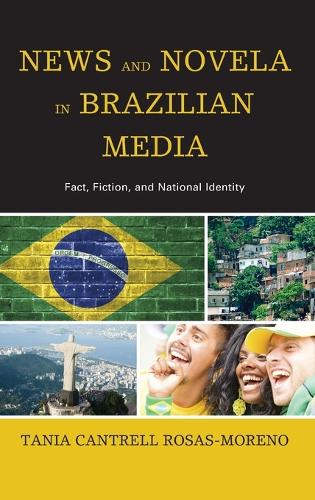
News and Novela in Brazilian Media: Fact, Fiction, and National Identity
(Hardback)
Publishing Details
News and Novela in Brazilian Media: Fact, Fiction, and National Identity
By (Author) Tania Cantrell Rosas-Moreno
Bloomsbury Publishing PLC
Lexington Books
25th June 2014
United States
Classifications
Professional and Scholarly
Non Fiction
Popular culture
Regional / International studies
079.810905
Physical Properties
Hardback
160
Width 171mm, Height 236mm, Spine 17mm
381g
Description
Citizens everywhere are turning to multiple news sources to inform their daily decisions. In Brazil, an emerging global power and democracy, those sources include the ever-popular telenovelas and, on a rising basis, newspapers. News and Novela in Brazilian Media: Fact, Fiction, and National Identity examines how news issues help frame telenovela plots, comparing key issues across Brazilian media to highlight differing levels of progression associated with press freedom. Scrutiny of concurrent print news stories, print news photos, and telenovela scenes indicate that when a hit telenovela is compared to news, the novela becomes a more progressive storyteller. At least, race, class, gender, and religious news issues seem more progressive: An Afro-Brazilian wins a local election; a favela or shantytown is idealized; a less popular African religion is heralded while Protestantism is marginalized and Catholicism continues as the right religion; and women achieving power leads to a more egalitarian society. In a diversifying media environment, where lines between fact and fiction are increasingly blurred, Brazilian alternative news studies are critical measures of Brazils state of media opening that inform national identity formation.
Reviews
Essential reading for Brazilianists--and even for laymen--who seek to revisit the relationship of the Brazilian media with soap operas, as well as a new look at the perspectives offered, related with national identity. * Luso-Brazilian Review *
Both news and telenovelas are considered central to a nations ongoing self-definition and the construction of imagined community. Dr. Rosas-Moreno has innovated in both her conceptual framework and her methods to compare news and novelas in how they construct images that are central to the media representation of daily life and national identity across Latin America. Her work is of great importance to those studying news, melodrama in all its forms, racial and gender issues, discourses about poverty, and portrayals of the hybridity of cultures, particularly in religion. -- Joseph Straubhaar, University of Texas at Austin
Rosas-Morenos detailed analysis of the intersection of news and fictional telenovela narratives substantially expands our understanding of the complex ways Brazilian mediathrough intertextual relationsco-produce and frame national discourse. This book presents an important contribution to the under-studied, but very influential Brazilian media industrial complex. -- Antonio C. La Pastina, Texas A&M University
In a solid and vast case study, Rosas-Moreno breaks new ground in situating the role of telenovelas as a prime storyteller in Brazilian society. Telenovelas take on contemporary topics of class, religion, and race, offering a forum where popular culture, public debate, and democratic opening converge in surprising ways. This book adds an important new dimension to telenovela studies. -- Thomas Tufte, Roskilde University
Author Bio
Tania Cantrell Rosas-Moreno is assistant professor in the Department of Communication at Loyola University Maryland.
